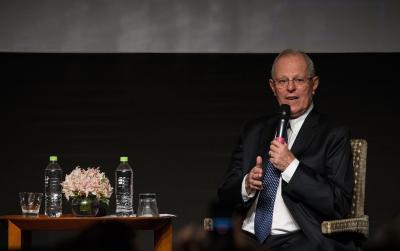World
Peruvian President loses allies over Fujimori pardon

Lima, Dec 27 (IANS) The repercussions of Peruvian President Pedro Pablo Kuczynski’s Christmas Eve pardon for disgraced former head of state Alberto Fujimori continued to be felt as allies distanced themselves from the incumbent, and human rights organisations explored ways to send Fujimori back to prison.
Roger Rodriguez, the head of the human rights division of the Justice Ministry, along with two members of Peru’s High-Level Commission on Peace, Reparation and Reconciliation, Daniel Sanchez and Katherine Valenzuela, announced their resignation on Tuesday, Efe news reported.
Their resignation letters were published in Lima daily La Republica.
Fujimori “did not qualify for the granting of a humanitarian pardon”, Rodriguez wrote, while Sanchez said he would find it “shameful” to represent the government in discussions with victims of Fujimori, who was sentenced to 25 years behind bars for massacres and other crimes committed during his 1990-2000 tenure.
Lawmaker Alberto de Belaunde also resigned from Kuczynski’s PPK party and two other members, Vicente Zeballos and Gino Costa, are expected to follow suit in the coming days amid continuing street protests over the pardon.
On another front, the human rights organisation Aprodeh asked the Inter-American Court of Human Rights to order the Peruvian government to provide information on the pardon and to hold a public hearing on the matter.
Kuczynski signed the pardon just three days after he avoided impeachment due to the votes of 10 opposition lawmakers led by Fujimori’s son Kenji, prompting many to suspect that political machinations were at work in the decision.
Kuczynski became President by defeating Keiko Fujimori — Kenji’s older sister — in a 2016 runoff. During the campaign, he vowed not to pardon Alberto Fujimori.
The Commission on Presidential Clemency concluded that Fujimori was suffering from a “progressive, degenerative and incurable disease” likely to be aggravated by the conditions in prison.
But according to legislator Indira Huilca, Fujimori enjoyed comfortable conditions in prison.
–IANS
soni/bg
World
Lockdowns in China Force Urban Communities to Defy Censorship and Vent Frustration Online

Shanghai’s rich middle class is leading a wave of online dissent over the strict and prolonged lockdowns imposed in various parts of the country. Chinese internet censorship is struggling as patience is wearing thin in many urban centers, coming up with creative forms of online protests.
Social Media Posts Revealing Lockdown Tension in Shanghai
Drawn-out lockdowns are nothing new in China as authorities insist with the nation’s zero-Covid policy since the start of the pandemic. Currently over This time around, however, metropolitan areas like Shanghai are increasingly difficult to keep quiet, given that its more than 25 million residents have seen weeks of total isolation along with food shortages and many other service interruptions.
Dozens of towns and reportedly over 300 million Chinese citizens have been affected by lockdowns of different severity. As expected, urban netizens have been most outspoken over their difficulties by finding creative ways to get around state censorship and bans placed on topics, news comments and spontaneous campaigns.
Shanghai residents have been using mobile proxies and hijacking seemingly unrelated hashtags to talk about healthcare issues, delivery failures and the overall severity of their situation. The “positive energy” that the Chinese government wants to transmit during the recent prolonged series of lockdowns does not come naturally to those counting food supplies and online censors are working hard to filter words, trending topics and undesired social media sharing.
WeChat groups and message threads are under constant monitoring. Posts questioning the zero-Covid approach have been quickly deleted, including by leading Chinese health experts like Dr. Zhong Nanshan. Video footage is soon censored and protests and investigations are quickly made to disappear.
Where this has not worked, officials have exposed banners with warnings and outright threats like “watch your own mouth or face punishment”, while drones have been patrolling the city skies. Yet, if anything, this has led to further tensions and unspoken confrontation with Shanghai’s educated and affluent middle class.
Creative Online Solutions Harnessing Civic Energy
Announcements by Chinese social media that they would be publishing the IP addresses of users who “spread rumors” have not helped either. Tech industry research has shown that much of Asia’s tech-savvy population has a habit of using mobile proxies and other privacy tools, quickly finding workarounds to browse the internet freely and talk to the world about the hottest topics.
The sheer volume of forbidden posts is already a challenge for the very censorship system, experts explain. Unable to track all trending hashtags, state workers overlook topics that speak about the US, Ukraine or other popular news. Linking human rights elsewhere to their situation, Chinese online dissidents establish their informal channels and “hijack” the conversation to share personal or publicly relevant information about the Covid suppression in their town.
Sarcastic and satirical posts still dominate. Others hope to evade the censors by replacing words from famous poems or the national anthem. One thing is certain – social media, when harnessed with the right creativity, has proven its ability to mount pressure on the government in even some of the most strictly controlled tech environments like China.











